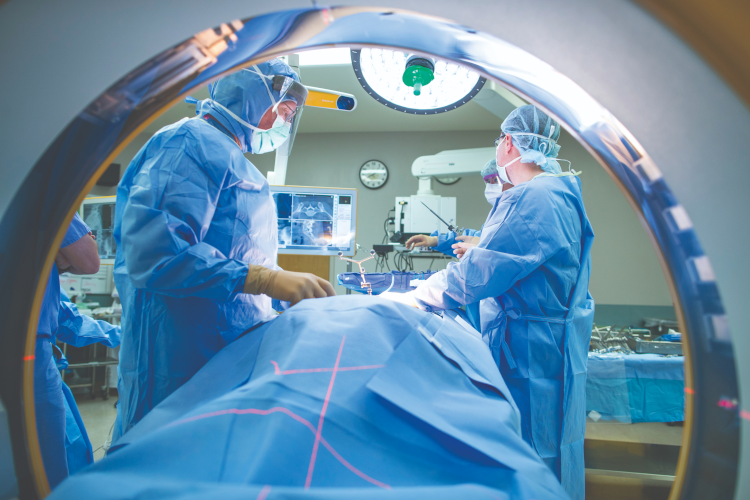What Is Colon Cancer?
Colon cancer is a disease in which malignant (cancer) cells form in the tissues of the colon, the main part of the large intestine.
Risk Factors
- Having a family history of colon or rectal cancer in a first-degree relative (parent, sibling, or child)
- Having a personal history of cancer of the colon, rectum, or ovary
- Having a personal history of high risk adenomas (colorectal polyps that are 1 centimeter or larger in size
- or that have cells that look abnormal)
- Having inherited changes in certain genes that increase the risk of familial adenomatous polyposis (FAP)
- or Lynch syndrome (hereditary nonpolyposis colorectal cancer)
- Having a personal history of chronic ulcerative colitis or Crohn's disease for 8 years or more
- Having three or more alcoholic drinks per day
- Smoking cigarettes
- Being black
- Being obese
Signs and Symptoms
- A change in bowel habits
- Blood (either bright red or very dark) in the stool
- Diarrhea, constipation, or feeling that the bowel does not empty all the way
- Stools that are narrower than usual
- Frequent gas pains, bloating, fullness, or cramps
- Weight loss for no known reason
- Feeling very tired
- Vomiting
Testing
The following tests and procedures may be used:
- Physical exam and health history: An exam of the body to check general signs of health, including checking for signs of disease, such as lumps or anything else that seems unusual
- Digital rectal examination (DRE): An exam of the rectum in which a doctor or nurse inserts a lubricated, gloved finger into the lower part of the rectum to feel for lumps or anything else that seems unusual
- Fecal occult blood test (FOBT): A test to check stool (solid waste) for blood that can only be seen with a microscope
- Barium enema: A series of X-rays of the lower gastrointestinal tract
- Sigmoidoscopy: A procedure to look inside the rectum and sigmoid (lower) colon for polyps (small areas of bulging tissue), other abnormal areas, or cancer
- Colonoscopy: A procedure to look inside the rectum and colon for polyps, abnormal areas, or cancer
- Virtual colonoscopy: A procedure that uses a series of X-rays called computed tomography to make a series of pictures of the colon
- Biopsy: The removal of cells or tissues, so a pathologist can view them under a microscope to check for signs of cancer
Prognosis Factors
The prognosis and treatment options depend on the following:
- The stage of the cancer (whether the cancer is in the inner lining of the colon only or has spread through
- the colon wall or has spread to lymph nodes or other places in the body).
- Whether the cancer has blocked or made a hole in the colon.
- Whether there are any cancer cells left after surgery.
- Whether the cancer has recurred.
- The patient's general health.
The prognosis also depends on the blood levels of carcinoembryonic antigen (CEA) before treatment begins. CEA is a substance in the blood that may be increased when cancer is present.
Stages of Colon Cancer
Download our Colon Cancer Booklet for more information about stages of Colon Cancer.
Treatment Options
The following are the different standard treatment options for patients with colon cancer:
- Surgery - Removing the cancer in an operation is the most common treatment for all stages of colon cancer. Depending on the stage and spread of the cancer, surgical options include local excision, resection of the colon with anastomosis, or resection of the colon with colostomy.
- Radiofrequency Ablation - Use of a special probe with tiny electrodes that kill cancer cells.
- Cryosurgery - Using instrument to freeze and destroy abnormal tissue.
- Chemotherapy - Using drugs to stop the growth of cancer cells either by killing the cells or by stopping the cells from dividing.
- Radiation therapy – Using high energy X-rays or other types of radiation to kill cancer cells or keep them from growing.
- Targeted therapy - Using drugs or other substances to identify and attack specific cancer cells. Options include Monoclonal Antibodies, Vascular Endothelial Growth Factor (VEGF) inhibitor therapy, and Epidermal Growth Factor Receptor (EGFR) inhibitor therapy.
- Immunotherapy – Uses substances made by the body or made in a laboratory to boost, direct, or restore the body's natural defenses against cancer.
Clinical Trials
- Patients may want to consider taking part in Clinical Trials, which test new treatments for colon cancer. Patients can enter clinical trials before, during, or after starting their cancer treatment.
Download our Colon Cancer Booklet for comprehensive information and illustrations.
This content was last medically reviewed in May 2022 by Sharlotte Manley, MSN, FNP, Erlanger Gastroenterology.





